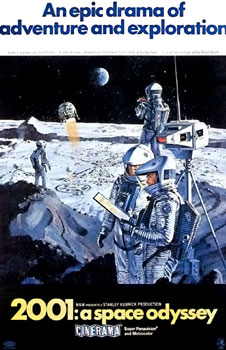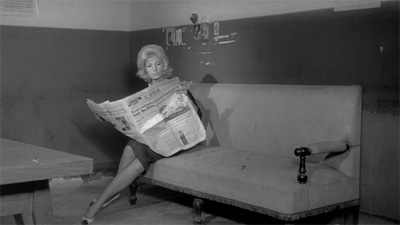 Read the following remarks at your own risk. The post begins one way and finishes in another.
Read the following remarks at your own risk. The post begins one way and finishes in another.
The online film journal Senses of Cinema has an excellent essay by Pedro Blas Gonzalez called Stanley Kubrick’s 2001: An Existential Odyssey. He examines 2001: A Space Odyssey from an existential viewpoint. He focuses primarily on astronaut Dave Bowman’s journey in the film toward not only a far-flung physical destination, but also his journey as a human being on a path toward knowledge, an unknown future and ultimate change or evolution. I’ve always viewed the Bowman character as being exceedingly emotional and noble in spite of the fact that he barely moves a facial muscle or changes his vocal tone. He seems on the surface to be little more than another machine on board the giant Jupiter-bound space ship. But he is in fact full of tiny, barely perceptible emotions and concerns that make him perhaps the greatest representative character for the human species in film history. The Bowman character completes his mission of discovery by surmounting incredible obstacles, included the most powerful example of artificial intelligence ever devised by humankind. But he does this without ever losing his capacity for anger, despair, love, fear, or wonder.
We’ve lived through what I consider to be the single worst decade in the history of the United States, including the time of the Civil War. In 2000, the country willfully elected to the presidency the most uneducated, unintelligent, disgusting, drunken, irresponsible, uncaring, warlike, criminal and religious fanatic in its history. The damage done to our own self-image, to our sense of wonder in the face of the magnificent unknown, to our drive forward technically, scientifically, artistically, and morally, to our own self-respect and our dignity in a world teeming with slavery and murder and starvation – well this damage is going to be exceedingly difficult to repair. We’ve seen the drive for knowledge turned into something that is suspect, something that religion should argue with and fight at every turn. This is the legacy of the first decade of the twenty-first century. The tragic crime committed by half of the population of the United States to elect – twice-over – the closest thing to an authoritarian leader we’ve ever had will not be wiped clean by voting for new candidates. These awful people are among us. They work with us in offices, in grocery stores, on farms, selling insurance, selling cars, investing on Wall Street. They are all around us and they are waiting to destroy again. They want us to be dumb and mute. They want us worshiping in their churches. They want women to answer to them for how they use their bodies. They want us to ignore the greatest scientific thoughts ever had and to replace them with tall-tales from an ancient book of children’s stories called The Bible. It has been my mission over the past year to fight these people and to rid this web site of them (thousands and thousands of them, by the way), and to break their web links by using aggressive and insulting language at every possible turn. I freely mix children’s stories and games with brutal assaults on this ignorant and dangerous population within our nation. After 15 years of experience with children’s web sites, I have decided that they are rubbish. They serve little purpose and make a pretense at wholesomeness and clean language which only does a disservice to our children who must grow up with the strength and knowledge to eradicate the foolishness that has prevailed over the past decade. I have no concern for who I may insult, including my own authors who may or may not want their content removed because of my strong views. My candle is a blowtorch and I turn it on barbarians with joy. The only effective way to fight them is to get excited about discovery and knowledge again – to do what Star Trek says we should do:
…to explore strange new worlds; to seek out new life and new civilizations; to boldly go where no one has gone before
Yes. We won’t get there by watching imbeciles like James Cameron film tales about white guys invading blue guys. 50-some-year-old adolescents pretending to be great directors don’t give us anything worth knowing. Artists like Kubrick do. Films like 2001: A Space Odyssey do. We need to take this next decade and use it to elevate ourselves beyond and out of reach of the poor lost savages we see around us driving their pick-ups, their SUVs, thumbing through their Bibles and Korans, and going to movies like Avatar. Let’s try thinking again. Go rent 2001. Watch it. Wonder. Think.

 The Auteurs (
The Auteurs (